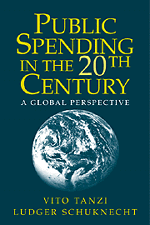Book contents
- Frontmatter
- Contents
- List of Tables
- Preface
- PART ONE The Growth of Government: A Historical Perspective
- PART TWO Gains from the Growth of Public Expenditure
- PART THREE The Role of the State and Government Reform
- PART FOUR Recent Experiences of Countries in Reforming the Government
- X Recent Reform Experience
- XI Fiscal Reform in the Public Debate
- XII The Future of Public Spending
- Bibliography
- Author Index
- Subject Index
XI - Fiscal Reform in the Public Debate
Published online by Cambridge University Press: 12 January 2010
- Frontmatter
- Contents
- List of Tables
- Preface
- PART ONE The Growth of Government: A Historical Perspective
- PART TWO Gains from the Growth of Public Expenditure
- PART THREE The Role of the State and Government Reform
- PART FOUR Recent Experiences of Countries in Reforming the Government
- X Recent Reform Experience
- XI Fiscal Reform in the Public Debate
- XII The Future of Public Spending
- Bibliography
- Author Index
- Subject Index
Summary
THE PROMINENCE OF FISCAL REFORM IN THE PUBLIC DEBATE
The public debate in industrial countries shows a keen awareness of the fiscal problems and recognizes the need for substantial changes in government programs. All major international financial and economic newspapers provide almost daily coverage of fiscal issues and of reform proposals. It is also rare now to find politicians running for election on a platform to increase the level of public spending. Of course, some groups or individuals would still like to have their own pet spending increased, but at the cost of someone else's reduction rather than through an increase in the total. Even relatively left-leaning governments, such as the French, Italian, and British governments of 1998, were advocating reductions in, or at least better control of, public spending.
Fiscal deficits, high public debt, and high public spending are seen at times as reasons why growth is sluggish, real interest rates and unemployment are high, and some social problems are getting worse. There are no Galbraiths at this time arguing that total public spending should increase. The climate has really changed from recent decades. To give a feel for the prevalent current mood, we shall cite from some influential newspapers. This is, of course, far from a scientific approach. Still, newspapers, better than anything else, reflect the current thinking. Obviously we can only cite selectively.
In the Independent of October 1, 1996, McRae pointed out that fewer than 10 countries in the world (out of almost 200 countries) had a fiscal surplus in 1995 and argued that this was an indication of “system failure for the world.”
- Type
- Chapter
- Information
- Public Spending in the 20th CenturyA Global Perspective, pp. 230 - 246Publisher: Cambridge University PressPrint publication year: 2000



